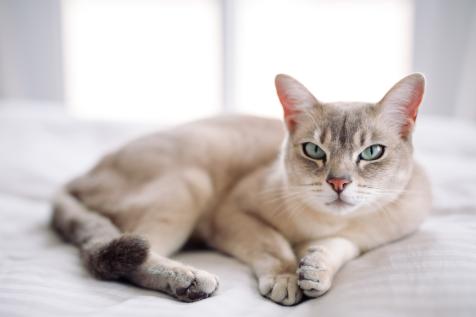Cats vaccination - the key to cats health

![2021-06-28_R_20307 (1).jpg]() Why vaccinate cats?
Why vaccinate cats?
Kittens and cats are at risk from a number of serious infections. You can help to protect against these diseases with a simple vaccination programme.
As both cats and their owners are very mobile it is possible that your pet will come into contact with infections present in unvaccinated cats and kittens or in the environment - for example, when your cat socialises with other cats in the neighbourhood, or if the cat goes into boarding for any reason, or into the vet clinic for another illness .
Vaccination is a cost effective way of protecting your cat or kitten against serious disease and the possible high costs involved in their treatment.
All Virbac vaccines are made to the highest standards of safety and effectiveness.
By vaccination, cats and kittens can be protected from the infectious diseases mentioned below.
Feline Infectious Enteritis
Feline infectious enteritis (FIE), also known as Feline Parvovirus, or Feline Panleukopenia, is a serious viral disease of cats. It is highly contagious and can spread rapidly. Kittens under 6 months of age are the most susceptible to developing severe disease.
Signs of disease include depression, vomiting, diarrhoea, marked dehydration and severe abdominal pain.
If a queens contracts the disease whilst pregnant, her kittens may be born with co-ordination problems (neurological disease) or other abnormalities, or abortion may occur.
The virus is very hardy and survives well in the environment. The small number of cats that do become infected and survive can carry the virus for some time. They can still infect other cats. All cats should be vaccinated for this virus to protect them from this deadly disease.
Feline respiratory diseases (Cat Flu)
The Feline Respiratory disease complex is almost always caused by one of two viruses, Feline Calicivirus (FCV) or Feline Viral Rhinotracheitis (FVR). These viruses can infect cats of all ages and the disease is very easily spread from cat to cat through coughing or sneezing.
Signs of this disease complex include sneezing, nasal and ocular discharge, depressed appetite and ulcers on the tongue and/or conjunctivitis of the eyes. Some of these signs can last for many weeks and cause significant discomfort.
Cat flu commonly occurs in multi-cat households. It is not uncommon for cats to become carriers after they have recovered from this disease and to infect other cats and, particularly, kittens. If an infected cat is unable to fully fight off the infection, the herpesvirus disease may become latent (hidden) just like in human herpes with the virus that causes cold sores in people.
When a cat becomes stressed, the herpes virus then can re-awaken, and cause illness again, even if the cat is vaccinated. This is why it is vitally important that all kittens are fully vaccinated with a highly effective vaccination in the first place, to prevent them getting sick and contracting a lifelong disease.
All cats should be annually vaccinated against Cat Flu - speak to your vet about vaccination if your cat is overdue.
Feline Leukaemia Virus (FeLV)
Feline Leukaemia Virus can cause significant disease in cats, and can be transmitted by infected cats years after they were initially infected. Approximately one third of infected cats remain infected until they die years later. These cats can transmit the disease in their saliva, tears, urine and faeces. As with other contagious diseases, this virus can be transmitted by sharing communal feeding areas, litter trays and toys and by mutual grooming.
Feline Leukaemia Virus often leads to a depressed appetite, weight loss, anaemia, vomiting, diarrhoea, reproductive problems and a highly increased risk of developing other infections and tumours. These signs can present years after the initial infection.
Kittens particularly are vulnerable to infection with this disease.
Talk to your veterinarian for their recommendation on vaccination against this disease in your cat.
Other types of Vaccinations
Talk to your veterinarian about other vaccinations they may recommend for your cat(s).
After-vaccination care
Vaccines are biological products and they are designed to stimulate the immune system. Therefore it is possible for an animal to develop signs of local discomfort or swelling at the site of injection.
Very occasionally particularly sensitive pets may over-react to the vaccine and in these rare instances you should consult your veterinarian immediately. These reactions do not mean that your cat is not being protected by the vaccine. These reactions are very uncommon.
The protection provided by a single course of vaccinations wanes slowly over time and it is advised that you re-vaccinate your cat every 12 months to ensure on-going and strong immunity.
Vaccination guidelines
For maximum protection by vaccination, it is recommended that you discuss the vaccination programme with your veterinarian. Below is a guide that will provide some direction towards a vaccination protocol for younger cats, however your veterinarian can offer specific advice for your animal.
| Age for vaccination | Vaccinate against |
| 8 weeks | Feline Infectious Enteritis Feline Calicivirus Feline Viral Rhinotracheitis |
| 12 weeks | Feline Infectious Enteritis Feline Calicivirus Feline Viral Rhinotracheitis |
| 16 weeks | Feline Infectious Enteritis Feline Calicivirus Feline Viral Rhinotracheitis |
“Leucogen” vaccine, against Feline Leukaemia Virus can be given to kittens 9 weeks of age and older. Two doses should be given with an interval of two to three weeks (this interval should not exceed four weeks) for the primary vaccination course.
All cats should be annually vaccinated - discuss with your vet if your cat's vaccination is due or overdue.

 Why vaccinate cats?
Why vaccinate cats?